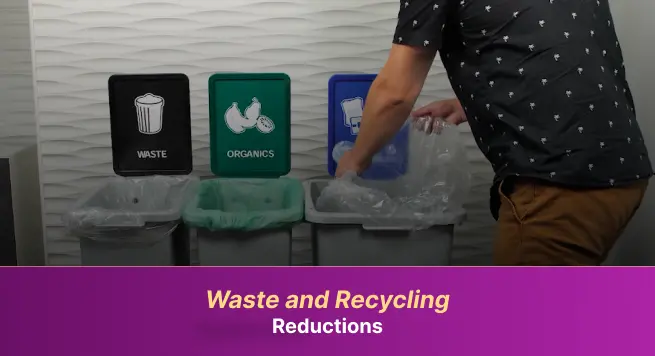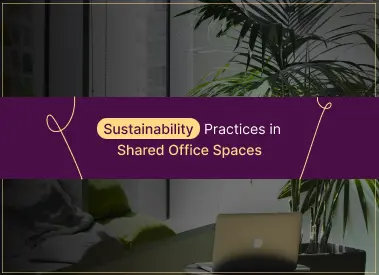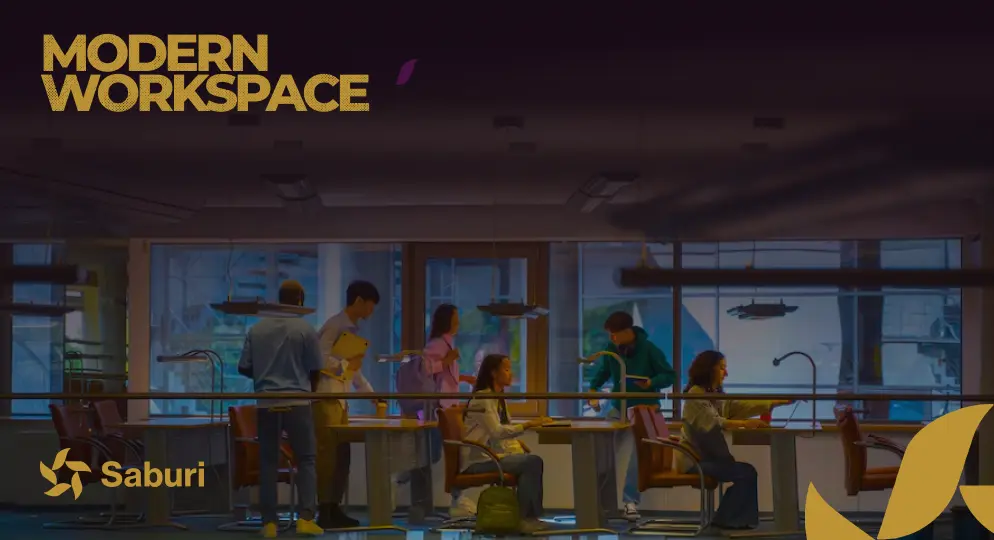Sustainability is not only a buzzword but it is important. The move to environmentally friendly practices such as shared office spaces is paving the way for a Green Revolution in Shared Office Spaces for businesses to try to cut their carbon footprint. These cutting-edge workspaces contribute towards a greener future by adopting environment-friendly norms and having a sustainable approach towards working.
Today, we look at the different sustainability practices shaping up in shared office spaces that are great for being more eco-friendly besides creating an exciting workplace experience.
Embracing Energy Efficiency/Maximizing Energy Efficiency in Workspaces
One of the areas where offices are making an impact is energy savings through office-sharing! These workspaces are doing everything from energy-saving lighting and temperature control systems to employing renewable energy sources to limit carbon use.
Most coworking spaces incorporate energy savings by utilizing natural lighting, thermodynamic insulation, and passive water cooling systems with a smart building management system. As energy-efficient workspaces, they both help the environment and save costs.
Waste and Recycling reductions

One of the low-hanging fruit of office sustainability initiatives is recycling bins. Shared workspaces are leading the way by offering a one-stop solution for recycling paper, metal, and glass. They’re also making significant progress in food composting, aiming to reduce landfill waste. Through targeted strategies, these offices are significantly cutting down on waste, helping to minimize disposables across the board.
Some shared office spaces, such as The Hub Oakland, Sauri are becoming even greener by offering composting facilities. This allows organic waste to be converted into soil much faster than it would in a landfill, reducing overall waste and supporting sustainable agricultural practices.
Fostering a Green Community
Communities that foster collaboration, creativity, and co-creation are placing sustainability at the forefront. These workspaces are cultivating an ethos of environmental awareness and accountability among their members.
Workshops on energy saving, waste reduction, and sustainability have become popular themes in shared office spaces across various communities. Such initiatives inspire members to adopt sustainable practices in both their work and personal lives, creating a positive ripple effect on a larger scale.
Sustainable Co-Working Spaces and Their Advantages

Improved Employee Well-Being
When organizations have authentic and sustainable initiatives in place, it is easier for employees to see their employer as one who cares about them than generating profit. These spaces often utilize biophilic design principles, integrating nature into the workspace to promote mental well-being.
Community and Collaboration
Sustainable co-working spaces cultivate a community of like-minded individuals and businesses committed to environmental stewardship. They often host networking events, workshops, and initiatives focused on sustainability, fostering collaboration and innovation among members.
Efficient resource sharing
These spaces facilitate the sharing of resources such as office equipment and meeting rooms. This collaborative approach reduces the need for individual businesses to invest in their equipment, leading to less waste and promoting a circular economy
Competitive Advantage
As sustainability becomes a priority for many businesses, co-working spaces that emphasize eco-friendly practices can differentiate themselves in a crowded market. This appeal to environmentally conscious entrepreneurs can enhance membership and retention rates.
Traditional vs Coworking Spaces: Forward for a Sustainable Future
The table below highlights the factors comparing sustainability practices between traditional office spaces and shared office spaces.
| Criteria | Traditional Office Space | Shared Office Space |
| Energy Efficiency | Often lacks comprehensive energy-saving measures | Prioritizes energy efficiency through design and technology |
| Waste Management | Limited recycling and waste reduction initiatives | Comprehensive recycling, composting, and waste minimization strategies |
| Sustainable Culture | Sustainability may not be a core focus | Fosters a community centered around environmental responsibility |
| Resource Utilization | Redundant resources for individual businesses | Shared resources and efficient space utilization |
| Environmental Impact | Higher carbon footprint and resource consumption | Reduced environmental impact through sustainable practices |
As the table highlights, shared office spaces are paving the way to sustainability compared to traditional offices in an environmentally friendly and resourceful manner.
Sustainable Commuting Initiatives
Shared office spaces are increasingly adopting sustainable travel practices to reduce their carbon footprint. Many of these workspaces offer various incentives and programs to promote greener modes of transportation, including:
Secure Cycle Storage and Shower Facilities:
Encouraging cycling to work by providing safe storage for bikes and shower amenities.
Ride-sharing and Carpooling Platforms:
Partnering with services to facilitate shared rides and reduce single-occupancy vehicle use.
Discounted Public Transportation Passes:
Offering reduced fares or priority rates for members to make public transit more accessible.
On-Site Electric Vehicle Charging:
Providing charging stations for electric vehicles to support eco-friendly transportation.
Flexible Work Arrangements:
Allowing remote work or flexible schedules to minimize daily commuting.
By promoting sustainable commuting options, shared office spaces not only cut down on emissions but also enhance the community’s overall quality of life and work experience.
Go for Sustainable Procurement and Supply Chain Management
Shared office spaces frequently adopt sustainable procurement practices by sourcing environmentally friendly goods and services from ethical suppliers. This approach includes:
Recycled and Biodegradable Supplies:
Purchasing products that are either recycled or designed to break down naturally, reducing waste.
Energy-Efficient Equipment:
Investing in equipment that uses less energy, thereby lowering overall energy consumption.
Ethical Vendor Partnerships:
Collaborating with suppliers who share the same commitment to sustainability and ethical practices.
By rigorously evaluating their supply chains and making conscious purchasing decisions, shared office spaces can further diminish their environmental impact while supporting businesses dedicated to sustainable practices.
Conclusion
Shared office spaces are at the forefront of sustainability, integrating energy-efficient technologies, effective waste management, and green commuting options. By reducing their carbon footprint and fostering eco-friendly practices, these spaces not only enhance environmental stewardship but also improve community well-being. As they continue to lead by example, shared office spaces are shaping a more sustainable and resource-efficient future.
We hope this blog has provided valuable insights into the Green Revolution in Shared Office Spaces. If you’re interested in learning more about how sustainability is transforming modern workspaces, we encourage you to visit us at Saburi Works. Explore our blog page for additional resources, expert advice, and tips on creating an eco-friendly, innovative workplace. Let Saburi Works be your partner in adopting greener practices for a more sustainable future.
Frequent asked questions
Coworking spaces are shared workspaces where individuals or teams can rent a desk or private office on a flexible basis. These spaces often provide amenities such as high-speed internet, meeting rooms, printers, technical support, and, in some cases, gym and cafeteria services.
Coworking spaces are shared workspaces where individuals or teams can rent a desk or private office on a flexible basis. These spaces often provide amenities such as high-speed internet, meeting rooms, printers, technical support, and, in some cases, gym and cafeteria services.
Coworking spaces are shared workspaces where individuals or teams can rent a desk or private office on a flexible basis. These spaces often provide amenities such as high-speed internet, meeting rooms, printers, technical support, and, in some cases, gym and cafeteria services.
Coworking spaces are shared workspaces where individuals or teams can rent a desk or private office on a flexible basis. These spaces often provide amenities such as high-speed internet, meeting rooms, printers, technical support, and, in some cases, gym and cafeteria services.
Coworking spaces are shared workspaces where individuals or teams can rent a desk or private office on a flexible basis. These spaces often provide amenities such as high-speed internet, meeting rooms, printers, technical support, and, in some cases, gym and cafeteria services.
Trending Blogs

Got Questions? We’ve got answers
Lorem ipsum dolor sit amet consectetur adipiscing eli mattis sit phasellus mollis sit aliquam sit nullam.



